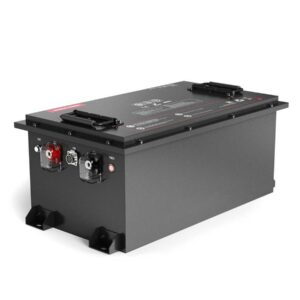
Are alkaline batteries better than zinc chloride?
Alkaline batteries outperform zinc chloride (carbon-zinc) batteries in capacity, discharge rates, and lifespan but cost 50-100% more. With 3-8× higher energy density and stable voltage under load, alkalines excel in high-drain devices like cameras and toys. Zinc chloride batteries remain cost-effective for low-power applications (clocks, remotes) despite lower environmental impact claims—though both require proper disposal due to heavy metals (Cd in zinc chloride) or corrosive electrolytes (KOH in alkalines).
Carbon Zinc Batteries vs Alkaline Batteries: Which Is Better?
What chemical differences define alkaline vs zinc chloride batteries?
Alkaline batteries use potassium hydroxide (KOH) electrolyte and zinc powder anodes, while zinc chloride types employ acidic zinc chloride/ammonium chloride paste with zinc sheet anodes. This structural variance enables alkalines’ superior current delivery and shelf life.

Practically speaking, the alkaline’s powdered zinc increases reaction surface area by 300-500% versus zinc chloride’s solid sheet. Combined with KOH’s ionic conductivity (2.5× higher than ZnCl₂), this allows sustained 1-2A pulses—critical for motorized devices. Pro Tip: Never mix alkaline and zinc chloride batteries in series; voltage disparities cause premature failure.
| Parameter | Alkaline | Zinc Chloride |
|---|---|---|
| Anode Material | Zinc powder | Zinc sheet |
| Electrolyte pH | 13-14 (basic) | 4-5 (acidic) |
| Typical Shelf Life | 5-7 years | 2-3 years |
How do discharge curves compare?
Alkalines maintain >1.2V for 80% of their capacity, while zinc chloride cells drop below 1.1V at 50% discharge. This voltage stability makes alkalines preferable for digital devices sensitive to power fluctuations.
Beyond voltage profiles, consider internal resistance: alkalines average 150-300mΩ versus 500-800mΩ for zinc chloride. Why does this matter? In a 2A-load flashlight, zinc chloride batteries waste 2W as heat (I²R=2²×0.5=2W), whereas alkalines lose just 0.6W—tripling runtime. Warning: High-drain zinc chloride cells may leak electrolyte when over-discharged due to gas buildup.
Battery Expert Insight
FAQs
Can I substitute zinc chloride for alkaline in remotes?
Yes, but expect 30-50% shorter lifespan. Zinc chloride’s 15-20mA continuous output suffices for IR remotes drawing <10mA.
Do alkalines leak more than zinc chloride?
No—quality alkalines have pressure-relief vents reducing leakage risk to <0.01% versus zinc chloride’s 2-5% failure rate after full discharge.
How to Safely Dispose of and Recycle Car Batteries
Are alkaline batteries better than zinc chloride batteries?
Yes, alkaline batteries generally outperform zinc chloride batteries. They offer higher energy density, longer lifespan, better performance in high-drain devices, and extended shelf life, making them ideal for modern electronics. Zinc chloride batteries are more economical but suited for low-drain devices.
How long do alkaline batteries last compared to zinc chloride?
Alkaline batteries can last up to three times longer than zinc chloride batteries in typical devices. Their higher energy density allows them to power high-drain electronics efficiently, while zinc chloride batteries require more frequent replacement.
Are alkaline batteries suitable for high-drain devices?
Yes, alkaline batteries handle high-current demands much better than zinc chloride. Devices like digital cameras, portable fans, and LED flashlights benefit from alkaline batteries’ consistent power output and extended runtime.
Are zinc chloride batteries cheaper than alkaline batteries?
Yes, zinc chloride batteries are more budget-friendly. They are a practical option for low-drain or infrequently used devices, such as remote controls and wall clocks, where long battery life is less critical.
Do alkaline batteries have a longer shelf life?
Yes, alkaline batteries retain their charge for several years when stored properly. In contrast, zinc chloride batteries tend to lose charge faster over time, making them less ideal for long-term storage.
Can zinc chloride batteries replace alkaline batteries?
Technically yes, zinc chloride batteries can replace alkaline batteries in low-drain devices. However, they provide less energy, shorter lifespan, and lower efficiency in high-drain applications, so alkaline is generally recommended.
Are alkaline batteries environmentally friendly?
Alkaline batteries are considered more environmentally friendly due to safer chemical composition and improved recycling processes. While still disposable, they produce fewer harmful chemicals than traditional zinc chloride batteries.
Where can I find high-quality batteries for OEM applications?
LiFePO4 Battery Factory, powered by Redway Battery, provides high-quality OEM lithium solutions including car starter, forklift, and golf cart batteries. Their expertise ensures reliable, long-lasting, and high-performance batteries tailored for bulk or custom needs.
If you want, I can also create a comparison table of alkaline vs zinc chloride batteries that is SEO-friendly and perfect for embedding in your FAQ page. Do you want me to do that?
